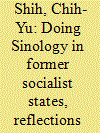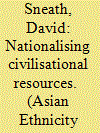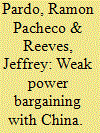|
|
|
Sort Order |
|
|
|
Items / Page
|
|
|
|
|
|
|
| Srl | Item |
| 1 |
ID:
137383


|
|
|
|
|
| Summary/Abstract |
Though the build-up of China's blue-water fleet is causing consternation in foreign-policy circles, the country's on-going expansion into Russia and the former Soviet Union has scarcely garnered comment. For the past decade, China has used its foreign reserves to acquire strategic assets (principally infrastructure and natural resources) and tracts of sovereign territory along its existing borders and increasingly further afield. The impact on targeted countries (and, in turn, their own foreign policy) is extreme, with serious implications for security and economics far beyond their borders. This article provides an overview of China's acquisitions and investments in Eurasia, followed by more detailed discussion of recent developments and responses in Central Asia, Ukraine and Mongolia, and Siberia. It then looks at the impact of China's actions on Sino-Russian relations, discusses the importance of Russia and Central Asia as a resource corridor and buffer zone between Europe and China, and suggests how these manoeuvrings might result in long-term benefits for China.
|
|
|
|
|
|
|
|
|
|
|
|
|
|
|
|
| 2 |
ID:
135419


|
|
|
|
|
| Summary/Abstract |
The study of China in each of the former socialist states has a long tradition in the humanities. Before the socialist period, the philological tradition was based largely on the legacy of French sinology. During the
socialist period, China Studies adopted scientific principles in accordance with Marxist perspectives, but these were primarily superimposed without any intellectual roots among sinologists. Such was the case in
Czechoslovakia, Mongolia, Poland, Russia, Vietnam, and the other socialist environments. The humanities were considered part of scientific research, thus making for a situation quite different from that in Western, primarily American, institutions of higher education, where the social sciences and the humanities were two different kinds of basic research, with their own epistemological assumptions and methodological approaches.
|
|
|
|
|
|
|
|
|
|
|
|
|
|
|
|
| 3 |
ID:
135768


|
|
|
|
|
| Summary/Abstract |
This article explores the Mongolian concept of ‘culture’ (soyol) and its transformation in the state socialist and post-socialist eras. The notion of culture and those without it – the soyolgui or ‘uncultured’ – played enormously important parts in the construction of the new society of the Mongolian People’s Republic. The history of the twentieth century shows a transformation of this highly normative concept from a category associated with teachings, doctrine, ethics and nurturing to one linked to modernist notions of hygiene, secular education, urbanism and cosmopolitanism. In addition, however, it became a category that included a set of historical styles and works thought of as national ‘cultural heritage’ (soyolyn öv). This was the result of a movement that in the late socialist period led to the critical re-evaluation of earlier Eurocentric uses of the ‘culture’ concept, and that sought new applications of the notion of ‘civilization’ – in particular by popularizing the metaphorical term ‘nomadic civilization’ (nüüdliin soyol irgenshil). I argue that these strands of thought have become central to the new nationalist politics of post-socialist Mongolia and form the basis of what remains by way of political orthodoxy, following the collapse of Soviet ideology.
|
|
|
|
|
|
|
|
|
|
|
|
|
|
|
|
| 4 |
ID:
135771


|
|
|
|
|
| Summary/Abstract |
This article traced the construction of the Mongolian term and concept böö mörgöl, which denotes ‘shamanism’, later developed to böögiin shashin meaning ‘shamanic religion’. Although the term bö’e (alternatively böge or böö), referring to spiritual practitioners such as shamans, appears early in the literature from the thirteenth century onward, the combination böö mörgöl and khara shajin meaning ‘black religion’ is fairly recent and first appeared in sources from the nineteenth century. Its latest version, böögiin shashin, has an even shorter history dating as recently to 1980s, and has spread rapidly over the last two decades. I argue that ‘shamanism’ in Mongolia has been constructed in scholarly works mostly by public involvement and shamans themselves. More precisely, academic discourses have played a key role in institutionalizing individual spiritual practitioners in two fields, first by creating a history for ‘Mongolian shamanism’ and second by creating archetypes for miscellaneous spiritual practices and practitioners. The concept böö mörgöl have been used in translating and importing the Western construction of ‘shamanism’ while in the next step of development, böögiin shashin was important in institutionalizing a national religion of shamanism versus world religions. As a result, Mongols have an original religion which has been the main building block in constructing Mongolian ‘nomadic civilization’.
|
|
|
|
|
|
|
|
|
|
|
|
|
|
|
|
| 5 |
ID:
135064


|
|
|
|
|
| Summary/Abstract |
This article draws on literature, media reports official Mongolian press releases and statements and a number of informal interviews and discussions with Mongolian policymakers and politicians.
Mongolia’s unique relationship with and access to the DPRK’s leadership has primarily proven to be a most valuable asset in boosting Mongolia’s profile in the region and the world at large. Whether Mongolia can spearhead a regional security mechanism, as suggested by both Mongolian politician and international analysts remain to be seen.
|
|
|
|
|
|
|
|
|
|
|
|
|
|
|
|
| 6 |
ID:
136768


|
|
|
|
|
| Summary/Abstract |
The article analyses Mongolian studies published in the journal Vestnik Buryatskogo Nauchnogo Tsentra Sibirskogo Otdeleniya Rossiyskoy Akademiyi Nauk which examines ethnic, linguistic and historical components of Mongolia’s history
|
|
|
|
|
|
|
|
|
|
|
|
|
|
|
|
| 7 |
ID:
135770


|
|
|
|
|
| Summary/Abstract |
This paper is concerned with the historical process by which elements drawn from a religious ‘civilisation’ have been reinvented as specifically national phenomena. It examines the Mongolian state ceremonies for sacred mountains conducted by the President as an example of the reinvention of an institution originally produced by the wider culture or civilisation of the Buddhist ecumene encompassing both Mongolia and Tibet. Such ritual, I argue, can be thought of as ‘cosmopolitical’ in that sense that they engaged with non-humans as actors in the political arena. Furthermore, the contemporary reinvention of these practices has generated a space for a very different, but also cosmopolitical, register for conceiving of relations between human persons and the landscape.
|
|
|
|
|
|
|
|
|
|
|
|
|
|
|
|
| 8 |
ID:
135201


|
|
|
|
|
| Summary/Abstract |
Twenty-five years after the Berlin Wall came down, a sense of missed opportunity hangs over the countries that once lay to its east. Back then, hopes ran high amid the euphoria that greeted the sudden implosion of communism. From Bratislava to Ulaanbaatar, democracy and prosperity seemed to be just around the corner.
|
|
|
|
|
|
|
|
|
|
|
|
|
|
|
|
| 9 |
ID:
135772


|
|
|
|
|
| Summary/Abstract |
In this article I explore some of the ways in which consumer discourse related to factory-produced tarag (drinkable yogurt) reflects concerns about food safety and cultural identity in Mongolia. Providing examples of how Mongolian industrial dairy producers position products made from imported milk powder as ‘local’, ‘pure’, and ‘natural’, I contrast consumers’ views of ‘artificial’ or ‘poisonous’ milk from Inner Mongolia (China), uncertainty over the nature of Mongolian milk products, and the increasing terminological confusion brought about by dairy process standardization. This paper draws on an analysis of comments posted to Mongolian-language online news sites, in response to rumours that ‘Goyo Tarag’ – a popular yogurt beverage manufactured by Orgil Foods – might in fact be Chinese in origin.
|
|
|
|
|
|
|
|
|
|
|
|
|
|
|
|
| 10 |
ID:
137020


|
|
|
|
|
| Summary/Abstract |
While focusing on the ‘third neighbour’ approach of Mongolia’s diplomacy of external relations, this article seeks to examine the effects of this new approach on India–Mongolia relations. It delves into the evolution of Mongolia’s ‘third neighbour’ policy and its implementation into forging a mutually beneficial cooperation in diverse areas with such ‘third neighbour’ nations or a group of nations that could help balance Mongolia’s two geographic neighbours—Russia and China. The article argues that such third neighbours have been identified to bolster Mongolia’s development, invest, and encourage the democratic transition/consolidation that is under way. In the case of India, ever since it began to be considered as one of Mongolia’s third neighbours, their relationship has witnessed a sea change, that is, the bilateral relations turned into a comprehensive partnership. Contrary to the ordinary viewpoint, the argument here is that India remains an important country for Mongolia in both regional and international contexts, particularly in the context of India’s role in promoting a multi-polar security structure in Asia. The Mongolians concede India’s positive influence on them and desire that the strong cultural relationship based on Buddhist traditions between the two sides should be translated into a strategic partnership. This is more so because Mongolia’s proximity with India appears to be a significant factor to balance off the equation with China.
|
|
|
|
|
|
|
|
|
|
|
|
|
|
|
|
| 11 |
ID:
134619


|
|
|
|
|
| Summary/Abstract |
This article examines Mongolia's and North Korea's bargaining with the People's Republic of China to provide insight into Northeast Asian regional dynamics and weak state bargaining behavior. The article demonstrates how both Mongolia and North Korea (which it demonstrates are weak states) employ a variety of tactics within the categories of capitulation, neutrality and confrontation when managing their respective relations with China. The article also argues the applica`bility of the two case studies to a better understanding of the diplomatic challenges China faces as it continues its development and to China's relations with the various weak states on its periphery.
|
|
|
|
|
|
|
|
|
|
|
|
|
|
|
|
|
|
|
|
|